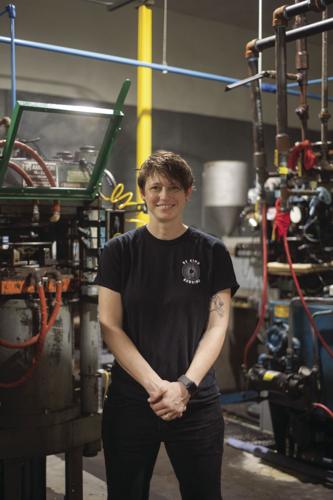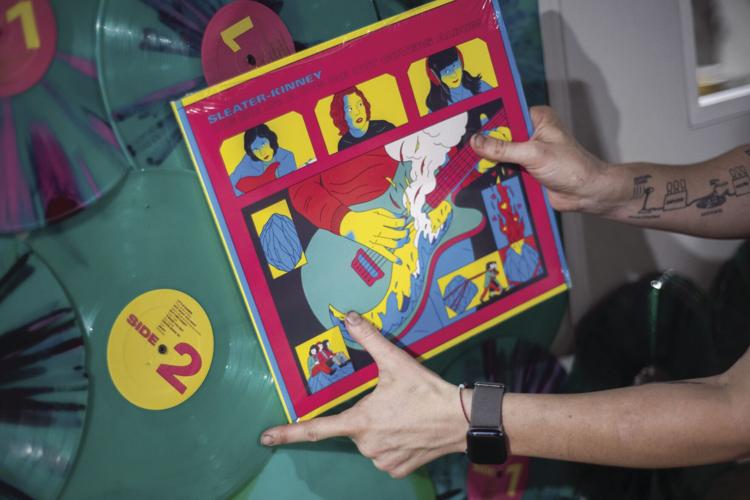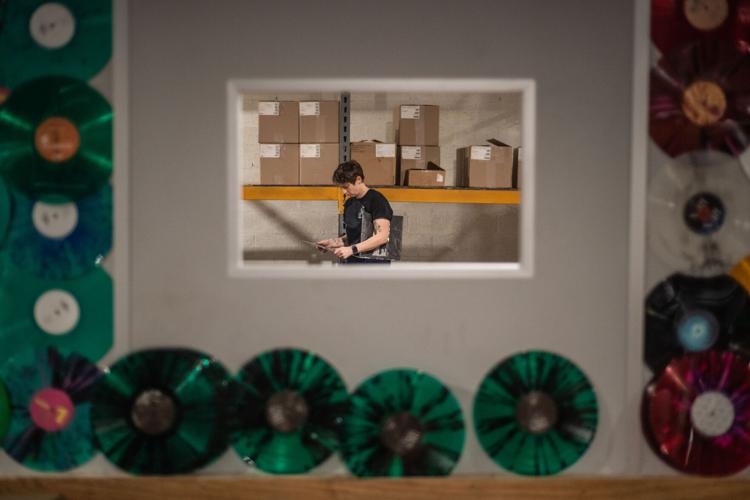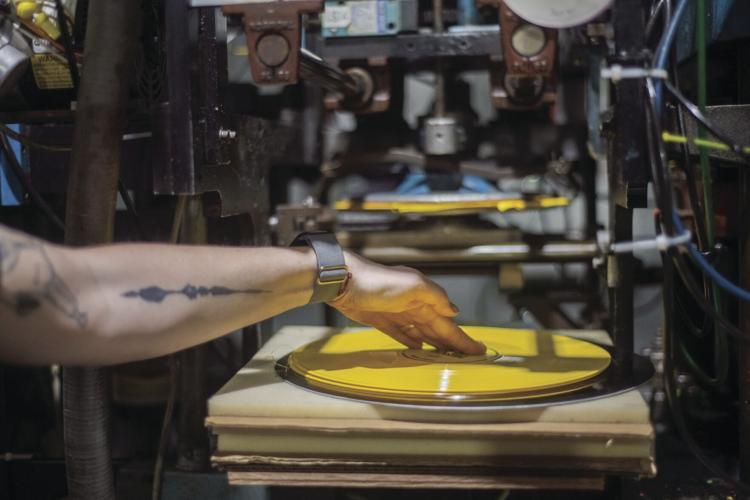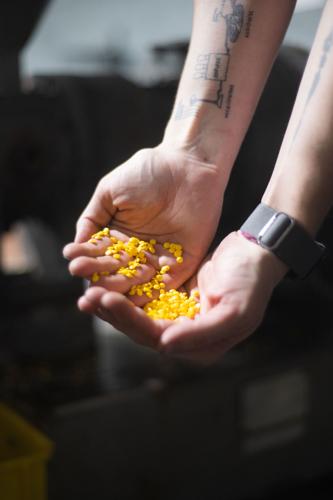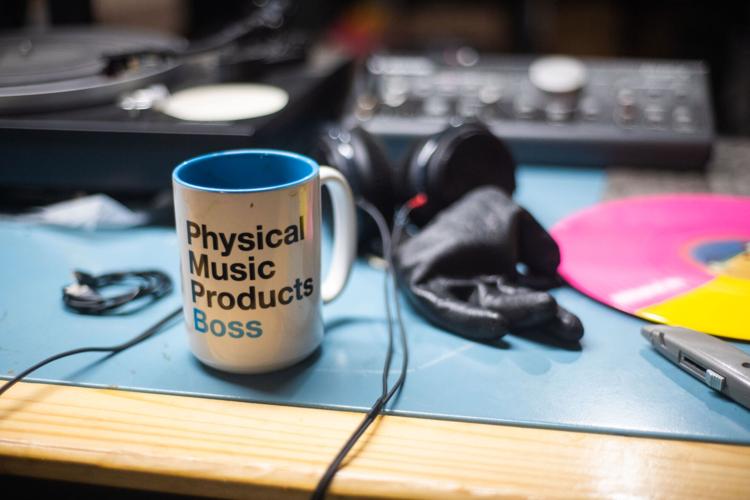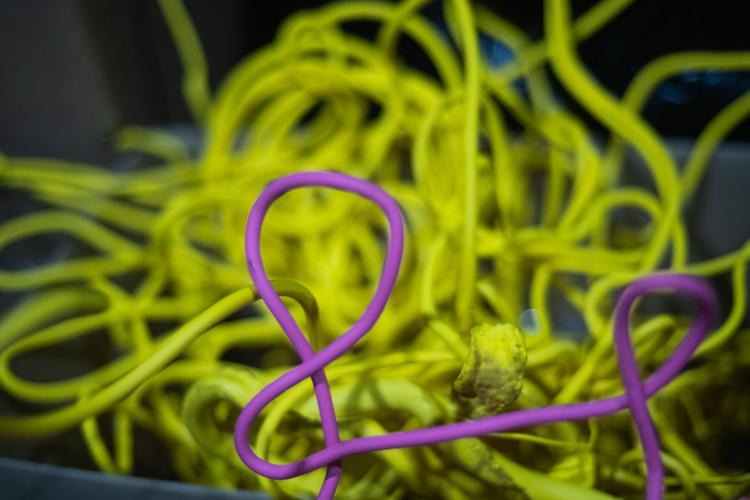
Piper Payne, president of Physical Music Products
When I arrive at Physical Music Products, a vinyl record plant just south of Nashville, I find the company’s president Piper Payne lying on the floor, fixing a pump on a record press. Payne is wearing black nylon running shorts, a vintage black Reba shirt cut into a sleeveless V-neck and black steel-toed boots. Impressively muscled and tattooed, she looks exactly like someone who built a manufacturing plant from scratch. Standing up, she runs her hands through her hair and says, “Maybe she’s born with it. Maybe it’s hydraulic fluid.”
In addition to being woman-owned, PMP has made a name for itself in relatively short order by working closely with independent labels and offering some of the fastest turnarounds in the business, at five to seven weeks. If you’ve tried to get physical records pressed, especially in the past few years, you know to expect long wait times and frustrating delays. One well-known component among the many that make up this complex problem: There is too little record production capacity to meet global demand. Vinyl sales have been on the rise for more than a decade, and vinyl outsold CDs for the first time last year. According to the Recording Industry Association of America, vinyl revenue grew 17 percent in 2022, making up nearly three-quarters of the revenue brought in by physical music sales.
Payne identifies two other areas of concern. One is that getting a quality issue rectified at a vinyl pressing plant is time-consuming. Another — brace yourself for a surprise — is money. Payne explains that bigger labels have the leverage to negotiate more favorable payment terms and avoid paying deposits. That can put plants in the position of having to float majors’ orders financially, making it necessary to finish huge orders of Taylor Swift or Adele records quickly in order to get paid; in the process, indie labels’ or artists’ smaller orders get held up.
Payne has been working in professional audio since 2009. With a BFA from the University of Michigan, she went to Norway for grad school and then worked as an assistant to famed mastering engineer Bob Katz. She made her way to San Francisco and spent eight years as a mastering engineer, handling what’s been called “the final creative step in the recording process.” Then Payne got involved in a small record-plant startup in the Bay Area. In her role as chief product officer, she was responsible for getting records made and making sure they sounded good.
When that business fell apart at the beginning of 2019, she got a job offer from Pete Lyman at Infrasonic Mastering and moved to Nashville, expecting to return to mastering full time. Payne’s reputation preceded her, and people started asking if she wanted to build a plant in Nashville.
“I was having a hard time helping my clients get their records made, and other plants were having quality issues and pricing and timeline issues,” Payne recalls. “And so I thought, ‘I’ll just build my own record plant.’” Her tone makes it sound as if she’s joking, but she’s not. Shout-out to stubbornness!
PMP’s rapid turnaround time is remarkable, and Payne attributes it to getting around issues that slow down the process at bigger facilities. Payne has three full-time and three part-time workers, half of whom are women. You probably aren’t wondering what they do for fun, but I’ll tell you: They teach themselves how to fix anything that can break. Everyone on the press floor understands how to repair the machines, increasing efficiency and leading to creative solutions to problems that other plants might struggle with. In addition, Payne doesn’t know of any other record plant in the world owned by a mastering engineer, who can quickly diagnose problems with test pressings.
“I haven’t found anybody faster,” she says. “We can do that because we work — we don’t wait.”

At Physical Music Products
Payne chose to run older presses that use legacy technologies, though she’s quick to point out that everything that touches the surface of a record is new. Some of the presses are from the 1950s and operate by hand. Though newer presses might work faster, they’re harder to repair and can require the attention of a specialist. PMP’s machines also are capable of some special techniques that produce spatters and swirls of color in the finished records.
PMP opened for business in February 2022 and pressed and shipped more than 200,000 records in its first year. “It’s not a huge number,” Payne says, “but we are good at this, and we care deeply about the product we’re putting out.”
Most of PMP’s clients have found the company through word of mouth, and Payne notes that they’re getting repeat business from engineers and labels. So far, they’ve pressed records for the likes of Dolly Parton, Sleater-Kinney, Mount Westmore, Madlib and the late, great J Dilla. A high percentage of their business comes from independent labels — one much-loved recent record pressed at PMP is Nashville indie YK Records’ vinyl edition of The Features’ The Mahaffey Sessions 1999. The firm aims to further strengthen its bond with indie labels through a partnership program; its goal is to get vinyl in the hands of up-and-coming artists, offering 100 records for $1,500. “Thao & the Get Down Stay Down is my white whale,” Payne says. “I would die if I ever got a chance to press a record for Thao.”

Sleater-Kinney records pressed at Physical Music Products
Right now, PMP has four automatic and four manually operated presses installed, with three automatics running and two more manual presses coming online soon. There’s room for an additional six automatic presses at the facility, and Payne gets very excited discussing ideas for growth.
“When we put out six more presses, I would love to see them partially financed by independent labels and independent artists. And then we run it, we support it, we staff it. … That would be super cool.”

